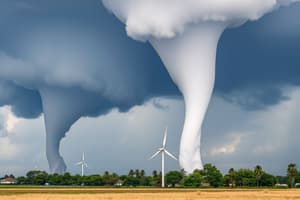Podcast
Questions and Answers
A waterspout is actually a weak __________ that forms over water.
A waterspout is actually a weak __________ that forms over water.
Tornado
How fast do raindrops fall?
How fast do raindrops fall?
7-18 miles per hour
How is snow formed?
How is snow formed?
Water vapor changes directly to ice high in the atmosphere
In which two seasons are thunderstorms most likely to occur?
In which two seasons are thunderstorms most likely to occur?
The __________ is the center of a hurricane and also the calmest part of the storm.
The __________ is the center of a hurricane and also the calmest part of the storm.
Tornadoes are rated on what kind of scale?
Tornadoes are rated on what kind of scale?
What causes the electric current that results in lightning?
What causes the electric current that results in lightning?
What does a Tornado Watch mean?
What does a Tornado Watch mean?
What is a monsoon?
What is a monsoon?
What is sleet?
What is sleet?
What is the name of the strong radar that helps predict weather?
What is the name of the strong radar that helps predict weather?
What type of cloud is below 6,500 feet in the atmosphere?
What type of cloud is below 6,500 feet in the atmosphere?
What type of cloud is between 6,500 feet to 18,000 feet in the atmosphere?
What type of cloud is between 6,500 feet to 18,000 feet in the atmosphere?
What type of cloud is above 18,000 feet in the atmosphere?
What type of cloud is above 18,000 feet in the atmosphere?
What type of cloud usually looks white and puffy?
What type of cloud usually looks white and puffy?
Where do tornadoes come from?
Where do tornadoes come from?
Which of the following is not a characteristic of a hurricane?
Which of the following is not a characteristic of a hurricane?
Which of these states are not in 'Tornado Alley'?
Which of these states are not in 'Tornado Alley'?
Which of the following is NOT needed to cause a blizzard?
Which of the following is NOT needed to cause a blizzard?
Flashcards are hidden until you start studying
Study Notes
Weather Phenomena
- A waterspout is a weak tornado that forms over water.
- Raindrops can fall at speeds ranging from 7 to 18 miles per hour.
- Snow is formed when water vapor changes directly into ice at high altitudes.
- Thunderstorms are most common in the spring and summer seasons.
- The calmest part of a hurricane is known as the eye.
Tornadoes
- Tornadoes are classified and rated using the F Scale.
- They originate from thunderstorms, where conditions create the necessary swirling winds.
- A Tornado Watch indicates that tornadoes are possible in the area.
Weather Events
- A monsoon is a seasonal wind pattern that often brings significant rainfall.
- Sleet occurs when rain freezes into ice before reaching the ground.
- Blizzard conditions do not require rotating storm clouds to occur.
Weather Prediction
- The Doppler radar is a critical tool for predicting and monitoring weather patterns, particularly storms.
Cloud Types
- Stratus clouds are typically found below 6,500 feet in the atmosphere.
- Alto clouds exist between 6,500 feet and 18,000 feet.
- Cirrus clouds are located above 18,000 feet and are often wispy in appearance.
- Cumulus clouds are characterized by their white, puffy appearance.
Tornado Geography
- States not considered part of "Tornado Alley" include North Carolina.
- Hurricanes do not form over mountainous regions; they require warm ocean water.
Studying That Suits You
Use AI to generate personalized quizzes and flashcards to suit your learning preferences.




